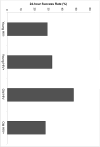The effects of HIV disease and older age on laboratory-based, naturalistic, and self-perceived symptoms of prospective memory: does retrieval cue type and delay interval matter?
- PMID: 27002287
- PMCID: PMC4959539
- DOI: 10.1080/13825585.2016.1161001
The effects of HIV disease and older age on laboratory-based, naturalistic, and self-perceived symptoms of prospective memory: does retrieval cue type and delay interval matter?
Abstract
There is a rising prevalence of older HIV+ adults who are at risk of deficits in higher order neurocognitive functions and associated problems in everyday functioning. The current study applied multiprocess theory to examine the effects of HIV and aging on measures of laboratory-based, naturalistic, and self-perceived symptoms of prospective memory (PM). Participants included 125 Younger (48 with HIV, age = 32 ± 4.6 years) and 189 Older (112 with HIV, age = 56 ± 4.9 years) adults. Controlling for global neurocognitive functioning, mood, and other demographics, older age and HIV had independent effects on long-delay time-based PM in the laboratory, whereas on a naturalistic PM task older HIV- adults performed better than older HIV+ adults and younger persons. In line with the naturalistic findings, older age, but not HIV, was associated with a relative sparing of self-perceived PM failures in daily life across longer delay self-cued intervals. Findings suggest that, even in relatively younger aging cohorts, the effects of HIV and older age on PM can vary across PM delay intervals by the strategic demands of the retrieval cue type, are expressed differently in the laboratory and in daily life, and are independent of other higher order neurocognitive functions (e.g., retrospective memory).
Keywords: HIV; Prospective memory; aging; episodic memory; neuropsychological assessment.
Conflict of interest statement
The authors have no financial conflicts of interest related to this work. The views expressed in this article are those of the authors and do not reflect the official policy or position of the Department of the Navy, Department of Defense, nor the United States Government.
Figures






References
-
- Manual of directions and scoring. Washington, DC: War Department, Adjutant General’s Office; 1944. Army Individual Test Battery.
-
- Brandimonte MA, Ferrante D, Feresin C, Delbello R. Dissociating prospective memory from vigilance processes. Psicológica. 2001;22:97–113.
Publication types
MeSH terms
Grants and funding
LinkOut - more resources
Full Text Sources
Other Literature Sources
Medical
